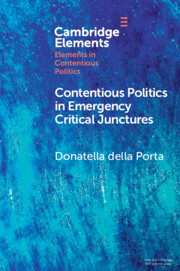Element contents
Contentious Politics in Emergency Critical Junctures
Published online by Cambridge University Press: 10 August 2022
Summary
Information
- Type
- Element
- Information
- Series: Elements in Contentious PoliticsOnline ISBN: 9781009025638Publisher: Cambridge University PressPrint publication: 15 September 2022
References
Accessibility standard: Unknown
Why this information is here
This section outlines the accessibility features of this content - including support for screen readers, full keyboard navigation and high-contrast display options. This may not be relevant for you.Accessibility Information
- 34
- Cited by
